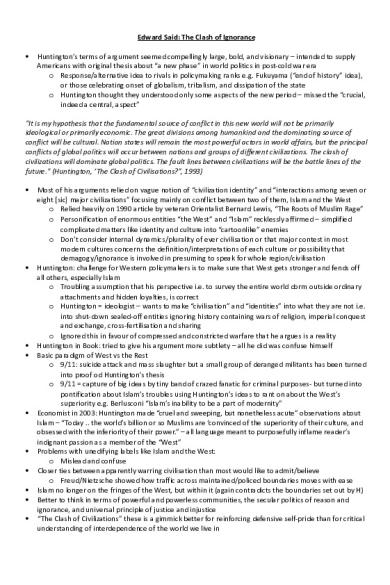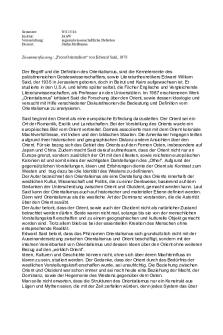Said - clash of ignorance PDF

| Title | Said - clash of ignorance |
|---|---|
| Author | Huda Daghem |
| Course | International Relations |
| Institution | University of Oxford |
| Pages | 1 |
| File Size | 66.4 KB |
| File Type | |
| Total Downloads | 55 |
| Total Views | 191 |
Summary
Said commentary on clash of civilisations notes...
Description
Edward Said: The Clash of Ignorance
Huntington’s terms of argument seemed compellingly large, bold, and visionary – intended to supply Americans with original thesis about “a new phase” in world politics in post-cold war era o Response/alternative idea to rivals in policymaking ranks e.g. Fukuyama (“end of history” idea), or those celebrating onset of globalism, tribalism, and dissipation of the state o Huntington thought they understood only some aspects of the new period – missed the “crucial, indeed a central, aspect”
"It is my hypothesis that the fundamental source of conflict in this new world will not be primarily ideological or primarily economic. The great divisions among humankind and the dominating source of conflict will be cultural. Nation states will remain the most powerful actors in world affairs, but the principal conflicts of global politics will occur between nations and groups of different civilizations. The clash of civilizations will dominate global politics. The fault lines between civilizations will be the battle lines of the future." (Huntington, ‘The Clash of Civilisations?”, 1993)
Most of his arguments relied on vague notion of “civilization identity” and “interactions among seven or eight [sic] major civilizations” focusing mainly on conflict between two of them, Islam and the West o Relied heavily on 1990 article by veteran Orientalist Bernard Lewis, “The Roots of Muslim Rage” o Personification of enormous entities “the West” and “Islam” recklessly affirmed – simplified complicated matters like identity and culture into “cartoonlike” enemies o Don’t consider internal dynamics/plurality of ever civilisation or that major contest in most modern cultures concerns the definition/interpretations of each culture or possibility that demagogy/ignorance is involved in presuming to speak for whole region/civilisation Huntington: challenge for Western policymakers is to make sure that West gets stronger and fends off all others, especially Islam o Troubling assumption that his perspective i.e. to survey the entire world dorm outside ordinary attachments and hidden loyalties, is correct o Huntington = ideologist – wants to make “civilisation” and “identities” into what they are not i.e. into shut-down sealed-off entities ignoring history containing wars of religion, imperial conquest and exchange, cross-fertilisation and sharing o Ignored this in favour of compressed and constricted warfare that he argues is a reality Huntington in Book: tried to give his argument more subtlety – all he did was confuse himself Basic paradigm of West vs the Rest o 9/11: suicide attack and mass slaughter but a small group of deranged militants has been turned into proof od Huntington’s thesis o 9/11 = capture of big ideas by tiny band of crazed fanatic for criminal purposes- but turned into pontification about Islam’s troubles using Huntington’s ideas to rant on about the West’s superiority e.g. Berlusconi “Islam’s inability to be a part of modernity” Economist in 2003: Huntington made “cruel and sweeping, but nonetheless acute” observations about Islam – “Today .. the world’s billion or so Muslims are ‘convinced of the superiority of their culture, and obsessed with the inferiority of their power.” – all language meant to purposefully inflame reader’s indignant passion as a member of the “West” Problems with unedifying labels like Islam and the West: o Mislead and confuse Closer ties between apparently warring civilisation than most would like to admit/believe o Freud/Nietzsche showed how traffic across maintained/policed boundaries moves with ease Islam no longer on the fringes of the West, but within it (again contradicts the boundaries set out by H) Better to think in terms of powerful and powerless communities, the secular politics of reason and ignorance, and universal principle of justice and injustice “The Clash of Civilizations” these is a gimmick better for reinforcing defensive self-pride than for critical understanding of interdependence of the world we live in...
Similar Free PDFs

Said - clash of ignorance
- 1 Pages

Orientalismo - Edward Said
- 29 Pages

Edward Said. Orientalismus
- 2 Pages

SAID. cultura e imperialismo
- 14 Pages

Clash Battle Tips - ssdsfsfsff
- 3 Pages

Must Finance and Strategy clash
- 2 Pages

Benjamin Franklin once said
- 1 Pages

He said it with arsenic
- 1 Pages

Orientalisme oleh Edward W. Said
- 6 Pages
Popular Institutions
- Tinajero National High School - Annex
- Politeknik Caltex Riau
- Yokohama City University
- SGT University
- University of Al-Qadisiyah
- Divine Word College of Vigan
- Techniek College Rotterdam
- Universidade de Santiago
- Universiti Teknologi MARA Cawangan Johor Kampus Pasir Gudang
- Poltekkes Kemenkes Yogyakarta
- Baguio City National High School
- Colegio san marcos
- preparatoria uno
- Centro de Bachillerato Tecnológico Industrial y de Servicios No. 107
- Dalian Maritime University
- Quang Trung Secondary School
- Colegio Tecnológico en Informática
- Corporación Regional de Educación Superior
- Grupo CEDVA
- Dar Al Uloom University
- Centro de Estudios Preuniversitarios de la Universidad Nacional de Ingeniería
- 上智大学
- Aakash International School, Nuna Majara
- San Felipe Neri Catholic School
- Kang Chiao International School - New Taipei City
- Misamis Occidental National High School
- Institución Educativa Escuela Normal Juan Ladrilleros
- Kolehiyo ng Pantukan
- Batanes State College
- Instituto Continental
- Sekolah Menengah Kejuruan Kesehatan Kaltara (Tarakan)
- Colegio de La Inmaculada Concepcion - Cebu






